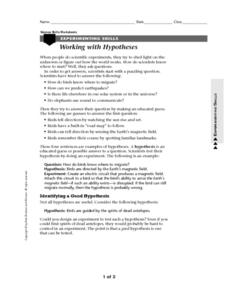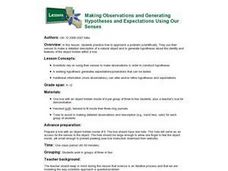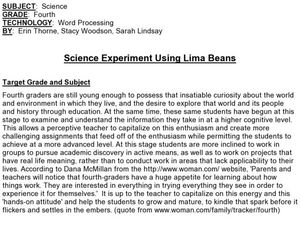Curated OER
Lesson: Taking Risks & Making Comparisons
Kids are asked how an Indian mandala was made. They devise a hypothesis and then use colored sand to test if their guesses were correct. They document the experience, examine a mandala, and write a comparative piece about the differences...
Curated OER
Generating Hypotheses and Experimental Design 1
Here is a thorough exercise in forming hypotheses for scientific investigations. Young scientists consider factors that may be related to the question they would like to address. They think through measurable changes that may result from...
Curated OER
Busted Bubbles
Using the scientific method, and bubble gum, learners conduct a motivating experiment. After conducting a series of tests involving bubble gum, they graph and analyze their results. This is the type of activity everyone loves.
Curated OER
Introduction to Scientific Investigation
What is a scientific investigation? What are the various parts of an experiment? This worksheet provides a basic review of most key terms: scientific method, manipulated variable, responding variable, hypothesis, controlled variable,...
Curated OER
What Caused the Water to Rise?
Students investigate a scientific phenomena. In this scientific investigation lesson plan, students hypothesize why water rises around a lit candle sitting in a pie tin of water as it is covered. They reflect on questions raised during...
Curated OER
Working With Hypotheses
For this science worksheet, students examine the topic in order to solidify knowledge covered in the curriculum using puzzles and creative games.
Curated OER
Modern Physics
In this physics activity, students tackle the hard questions about scientific theory and take a look at the First and Second Laws of Thermodynamics.
Curated OER
The Egg Activity
High schoolers comprehend the three basic steps of science: 1) Observation, 2) Statements of cause and effect (Hypotheses), and 3) Testing. By working with an egg, students are required to observe an object that is very common to them. ...
Curated OER
Making Observations and Generating Hypotheses
Students practice how to approach a problem scientifically. They use their senses to make a detailed description of a natural object and to generate hypotheses about the identity and features of the object hidden within a box.
PBS
Conceptualizing an Experiment
Students analyze information from a variety of sources in order to create a hypothesis about the origin of an interesting family artifact. They create alternative hypotheses based upon available information in order to understand that...
Curated OER
Burning It Up
Students explore energy as it relates to body function. Data about the personal physical activity of students is gathered and entered into a database which is utilized to test hypotheses made.
Curated OER
A Valid Conclusion? Testing and Reporting on Hypotheses Using the Scientific Method
Students explore importance of accuracy in reporting, focusing particularly on articles documenting scientific discoveries, and practice scientific method by conducting experiments to test and report on scientific hypotheses.
Curated OER
Coal Flowers
Let's make coal flowers! With this fun activity, young learners watch and learn as they grow crystals! With simple household materials and the instructions included in this lesson plan, your class can grow their own crystals. Learners...
Curated OER
What Color is Chlorophyll?
Students observe the interactions of chlorophyll and light. They develop and form their own testable hypotheses. Students predict the color of chlorophyll in various types of plants.
Curated OER
Science Experiment Using Lima Beans
Fourth graders tie together elements about the world and their environment. Students incorporate styles of higher order thinking skills. Students measure skills of observations, conclusions, inferences and predictions.
Curated OER
Point of View and Scientific Truth
High schoolers investigate the mystery of the "destructive force." They explore the concepts of natural phenomena. Students discuss the limited aspects of natural phenomena and the "whole truth" to generate new hypotheses that can be...

















